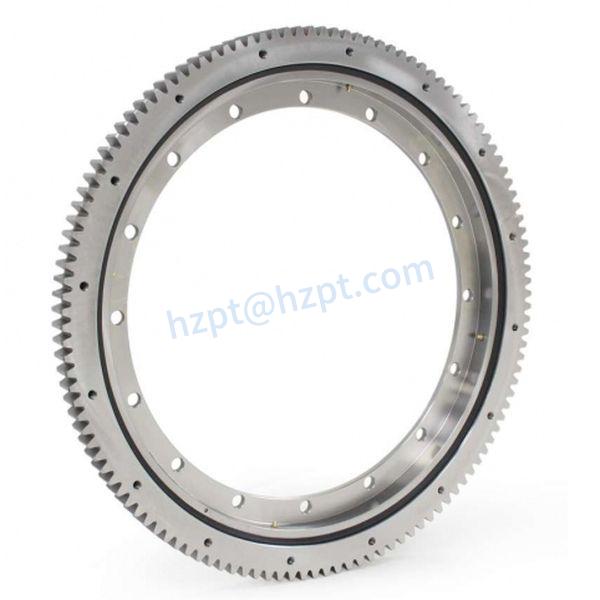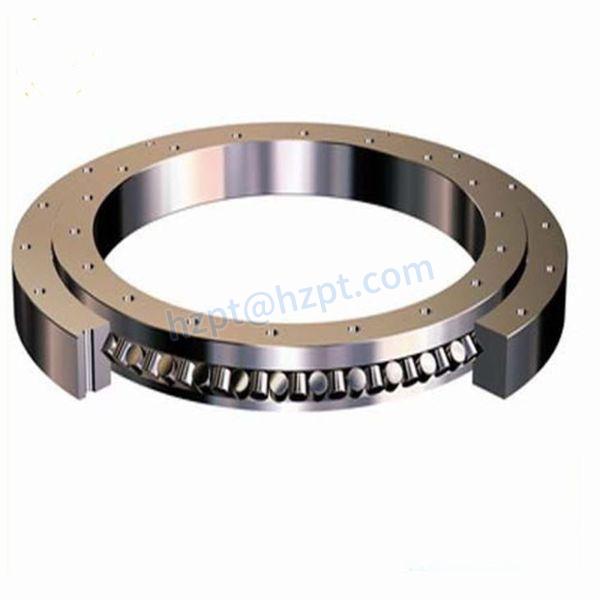Product Description
Ball Bearing Slewing Ring Bearing 011.45.1600 External Gear Teeth Turntable Bearing Made In China
Four-point contact ball slewing turntable bearings
consist of 2 ring seats. Compact structure, light weight, steel ball and arc track contact at 4 points, can bear axial force, radial force and overturning moment at the same time, has strong dynamic load.
Single row cross roller slewing bearing
Composed of 2 or 3 rings. compact structure, light weight, high manufacturing accuracy, small assembly gap and high requirement for installation accuracy. Rollers are 1:1 cross-arranged.
Can be bear axial force, overturning moment and large radial force at the same time,and widely used in lifting transportation, construction machinery and precesion products.
Double row ball slewing bearings
This kind of bearings can support high static loads with simple structures. They are mainly used in situations with variation load position and direction and continuously rotating. Main applications of this kind of bearings are deck hoisting, mining and material handling etc.
Three row roller slewing bearing
Three row roller bearing CZPT to bear all kinds of loads at the same time, it is the largest 1 of the 4 structural products with large axle and radial dimensions and firm structure. Especially suitable for heavy machinery requiring larger diameter, such as bucket wheel stacker and reclaimer, wheel crane, marine crane, port crane, ladle turret,large tonnage truck crane,heavy machinery and so on.
| Type | • Single row 4 point contact ball slewing bearing • Single row crossed cylindrical roller slewing bearings • Double row ball slewing bearings •Double row Roller/ball combination slewing bearing •Three-Row Roller Slew Ring Bearing |
| Rolling elements | Steel ball / Cylinder Roller |
| Rolling elements Material | GCr5/GCr15SiMn/Customized |
| Bearing Material | 50Mn/42CrMo/42CrMo4V /Customized |
| Cage Material | Nylon/ steel /copper |
| Structure | taper pin , Mounting holes,Inner ring ,grease fitting,load plug, seals , roller ,spacer balls or separators |
| Outer diameter | 50-10000mm |
| Bore size | 50-10000mm |
| Mounting hole | Through hole/Tapped hole |
| Raceway hardness | 55-62HRC |
| Inner and outer ring modulation hardness |
229-269HB/Customized |
| Gear type | No gear ,Internal gear , External gear. |
| Embellish grease | EP2 lithium lubricating grease |
| Certificate | ABS.BV,DNV,ISO9001,GL,3.1,3.2 |
| Application area | Ladle turret,Stacker crane,Bucket wheel machine,Solar heliostat Tracking System,port crane, Cabling machine,tower crane , offshore platform,ferris wheel, Palletizing robot,Rotary metallurgical furnace,can packing machine,Wind blade transporter,shield tunneling machine,tube push bench,excavator |
| Brand Name | LYMC |
| Place of Origin | HangZhou ZheJiang |
| Warranty | 12 months |
| Payment term | T/T is our first choice |
|
Packing details |
1,Filling with anti-rust oil 2.Corved with Plastic paper 3.Corved with kraft paper 4.Corved with Blue tie 5.Put in wooden box |
Product Process
Application:
– Excavators – Drilling rigs – Mining Equipments – Cranes -Offshore Equipments – Vehicles – Machine Tools – Wind Turbines
About Us:
HangZhou MC Bearing Technology Co.,Ltd (LYMC),who is manufacture located in bearing zone, focus on Slewing bearing, cross roller bearing and pinion,Dia from 50mm-8000mm, Our team with technical and full experience in the bearing industry.
*Professional in researching, developing, producing & marketing high precision bearings for 16 years;
*Many series bearings are on stock; Factory directly provide, most competitive price;
*Advanced CNC equipment, guarantee product accuracy & stability;
*One stop purchasing, product include cross roller bearing, rotary table bearing, robotic bearing, slewing bearing, angular contact ball bearing, large and extra large custom made bearing, diameter from 50~9000mm;
*Excellent pre-sale & after sale service. We can go to customers’ project site if needed.
*Professional technical & exporting team ensure excellent product design, quotation, delivering, documentation & custom clearance.
Our Service:
FAQ:
1.Q: Are you trading company or manufacturer ?
A: We are professional slewing bearing manufacturer with 20 years’ experience.
2.Q: How long is your delivery time?
A: Generally it is 4-5 days if the goods are in stock. or it is 45 days if the goods are not in
stock, Also it is according to quantity.
3.Q: Do you provide samples ? is it free or extra ?
A: Yes, we could offer the sample, it is extra.
4.Q: What is your terms of payment ?
A: Payment=1000USD, 30% T/T in advance, balance before shipment.
5.Q: Can you provide special customization according to the working conditions?
A: Sure, we can design and produce the slewing bearings for different working conditions.
6.Q: How about your guarantee?
A: We provide lifelong after-sales technical service.
/* January 22, 2571 19:08:37 */!function(){function s(e,r){var a,o={};try{e&&e.split(“,”).forEach(function(e,t){e&&(a=e.match(/(.*?):(.*)$/))&&1
| Standard or Nonstandard: | Standard |
|---|---|
| Feature: | High Speed, Cold-Resistant, Corrosion-Resistant, Heat-Resistant |
| Sealing Gland: | Sealed On Both Sides |
| Rolling-Element Number: | Single-Row |
| Material: | 50mn/42CrMo |
| Type: | External Gear |
| Samples: |
US$ 240/Piece
1 Piece(Min.Order) | |
|---|
| Customization: |
Available
| Customized Request |
|---|

Can you Explain the Concept of Axial and Radial Load Capacity in Slewing Bearings?
The axial and radial load capacities are fundamental parameters that define the ability of slewing bearings to withstand different types of loads along different directions. Here’s an explanation of these concepts:
- Axial Load Capacity:
The axial load capacity of a slewing bearing refers to its ability to withstand loads that act parallel to the axis of rotation. In other words, it’s the maximum force that can be applied along the vertical or horizontal axis without causing significant deformation or failure of the bearing components.
For example, in applications where the bearing supports vertical loads like those encountered in cranes or excavators, the axial load capacity is crucial to ensure the stability and safety of the equipment. Slewing bearings designed for high axial load capacities have sturdy components and optimized raceway profiles to distribute the load evenly and prevent stress concentrations.
- Radial Load Capacity:
The radial load capacity of a slewing bearing pertains to its ability to withstand loads that act perpendicular to the axis of rotation. These loads are directed toward or away from the center of the bearing. Radial loads can result from weight, force, or moments acting perpendicular to the axis of rotation.
For instance, in applications involving cantilevered structures, the radial load capacity is essential to support the bending moments and forces applied to the bearing. Slewing bearings with high radial load capacities are designed to handle these loads without excessive deformation, minimizing wear and maintaining operational integrity.
- Combined Load Situations:
Real-world applications often involve combinations of axial and radial loads. Slewing bearings must be selected and designed to handle these combined loads effectively. Engineers consider both axial and radial load capacities to ensure that the bearing can safely operate under the expected loading conditions.
Manufacturers provide load rating charts and data that specify the maximum axial and radial loads a slewing bearing can handle. Engineers use this information to make informed decisions about bearing selection for various applications.
In summary, the axial and radial load capacities of slewing bearings are essential parameters that determine their ability to withstand specific types of loads in various directions. Proper consideration of these capacities ensures safe and reliable operation in diverse applications.

What are the Common Maintenance Practices for Ensuring the Durability of Slewing Bearings?
Maintaining slewing bearings is crucial for ensuring their longevity and optimal performance. Here are some common maintenance practices to enhance the durability of slewing bearings:
- Regular Inspection:
Perform routine visual inspections to check for signs of wear, corrosion, and damage. Inspect seals, lubrication levels, and any unusual noises or vibrations during operation.
- Lubrication:
Follow the manufacturer’s guidelines for lubrication intervals and use appropriate lubricants. Lubricate the bearings to ensure smooth operation, reduce friction, and prevent wear.
- Seal Maintenance:
Inspect and maintain seals to prevent the ingress of contaminants such as dust, dirt, and moisture. Damaged or worn seals should be replaced promptly.
- Cleaning:
Regularly clean the bearing and its surrounding area to remove dirt, debris, and contaminants that could affect performance. Keep the bearing environment as clean as possible.
- Environmental Protection:
If the bearings are exposed to harsh conditions, consider using protective covers or shields to prevent direct exposure to elements like water, chemicals, and abrasive materials.
- Alignment and Mounting:
Ensure proper alignment during installation to prevent unnecessary stress on the bearing. Accurate mounting reduces the risk of misalignment-related failures.
- Torque Monitoring:
If the bearing has gears, regularly monitor and maintain the torque levels to prevent overloading and premature wear.
- Load Distribution:
Operate the machinery within the specified load limits to avoid overloading the bearing, which can lead to fatigue and failure.
- Replacement of Worn Components:
If any components, such as seals or lubrication fittings, show signs of wear, replace them promptly to maintain the integrity of the bearing system.
- Documentation:
Maintain records of maintenance activities, including lubrication schedules, inspections, and any repairs or replacements. This documentation helps track the bearing’s history and aids in decision-making.
- Training:
Ensure that maintenance personnel are adequately trained to carry out proper inspection, lubrication, and maintenance procedures.
By implementing these maintenance practices, you can maximize the service life of slewing bearings, minimize downtime, and maintain consistent machinery performance.

What are the Materials Commonly Used in Manufacturing Slewing Bearings and Their Respective Benefits?
Slewing bearings are manufactured using a variety of materials, each offering specific benefits that suit different industrial applications. Some common materials and their advantages include:
- Steel:
High-quality steel, such as chrome or stainless steel, is widely used due to its durability, strength, and resistance to corrosion. Steel bearings can handle heavy loads and offer excellent wear resistance, making them suitable for heavy-duty applications.
- Forged Steel:
Forged steel is even more robust than standard steel due to the manufacturing process that aligns the grain structure. This material is suitable for applications with extreme loads, harsh environments, and high impact forces.
- Bearing Steel:
Bearing steel, designed specifically for rolling-element bearings, provides superior hardness and wear resistance. It’s commonly used in slewing bearings to extend their service life and minimize wear.
- Alloy Steel:
Alloy steels offer a combination of strength, toughness, and corrosion resistance. They are suitable for applications that require both load-bearing capacity and resistance to challenging conditions.
- Cast Iron:
Cast iron is often used in smaller, low-load slewing bearings. It provides good damping properties and is cost-effective for less demanding applications.
- Bronze:
Bronze bearings are known for their self-lubricating properties and resistance to corrosion. They are commonly used in applications where maintenance-free operation and low friction are important.
- Plastics and Polymers:
Various plastics and polymers are employed for their lightweight, corrosion resistance, and low friction characteristics. These materials are suitable for applications that require chemical resistance and reduced noise levels.
- Ceramics:
Ceramic materials offer excellent corrosion resistance, high temperature resistance, and electrical insulation properties. While less common, they are used in specialized applications like semiconductor manufacturing and certain medical equipment.
- Coatings:
Special coatings like zinc, nickel, or chrome plating can be applied to enhance corrosion resistance and reduce friction. These coatings are often used in combination with other base materials to improve performance.
Choosing the appropriate material depends on factors like load, environment, operating conditions, and maintenance requirements. Engineers carefully consider these factors to ensure that the selected material aligns with the specific needs of the application.


editor by CX 2024-04-24
by
Leave a Reply